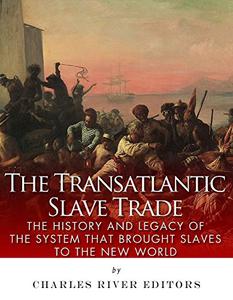
The Transatlantic Slave Trade: The History and Legacy of the System that Brought Slaves to the New World by Charles River Editors
English | May 20, 2015 | ISBN: 1512290491 | 66 pages | EPUB | 2.68 Mb
*Includes pictures *Includes accounts of the slave trade written by British sailors and former slaves *Includes online resources and a bibliography for further reading *Includes a table of contents "The deck, that is the floor of their rooms, was so covered with the blood and mucus which had proceeded from them in consequence of the flux, that it resembled a slaughter-house. It is not in the power of the human imagination to picture a situation more dreadful or disgusting. Numbers of the slaves having fainted, they were carried upon deck where several of them died and the rest with great difficulty were restored. It had nearly proved fatal to me also." - Dr. Alexander Falconbridge, an 18th century British surgeon It has often been said that the greatest invention of all time was the sail, which facilitated the internationalization of the globe and thus ushered in the modern era. Columbus' contact with the New World, alongside European maritime contact with the Far East, transformed human history, and in particular the history of Africa. It was the sail that linked the continents of Africa and America, and thus it was also the sail that facilitated the greatest involuntary human migration of all time. The African slave trade is a complex and deeply divisive subject that has had a tendency to evolve according the political requirements of any given age, and is often touchable only with the correct distribution of culpability. It has for many years, therefore, been deemed singularly unpalatable to implicate Africans themselves in the perpetration of the institution, and only in recent years has the large-scale African involvement in both the Atlantic and Indian Ocean Slave Trades come to be an accepted fact. There can, however, be no doubt that even though large numbers of indigenous Africans were liable, it was European ingenuity and greed that fundamentally drove the industrialization of the Transatlantic slave trade in response to massive new market demands created by their equally ruthless exploitation of the Americas. In time, the Atlantic slave trade provided for the labor requirements of the emerging plantation economies of the New World. It was a specific, dedicated and industrial enterprise wherein huge profits were at stake, and a vast and highly organized network of procurement, processing, transport and sale existed to expedite what was in effect a modern commodity market. It existed without sentimentality, without history, and without tradition, and it was only outlawed once the advances of the industrial revolution had created alternative sources of energy for agricultural production. The Transatlantic Slave Trade: The History and Legacy of the System that Brought Slaves to the New World looks at the notorious trade network. Along with pictures of important people, places, and events, you will learn about the Transatlantic slave trade like never before, in no time at all.
https://www.uploadcloud.pro/iusqj9kjrmk8/a907l.T.T.S.T.T.H.a.L.o.t.S.t.B.S.t.t.N.W.rar.html
Download from NovaFile
https://nfile.cc/vLAmzmJL/a907l.T.T.S.T.T.H.a.L.o.t.S.t.B.S.t.t.N.W.rar

https://uploadgig.com/file/download/4de6F34D985e7646/a907l.T.T.S.T.T.H.a.L.o.t.S.t.B.S.t.t.N.W.rar

https://rapidgator.net/file/d7561880197e0fc235be7e5cdc5e0337/a907l.T.T.S.T.T.H.a.L.o.t.S.t.B.S.t.t.N.W.rar.html

https://nitroflare.com/view/A3FF448C1619A30/a907l.T.T.S.T.T.H.a.L.o.t.S.t.B.S.t.t.N.W.rar
